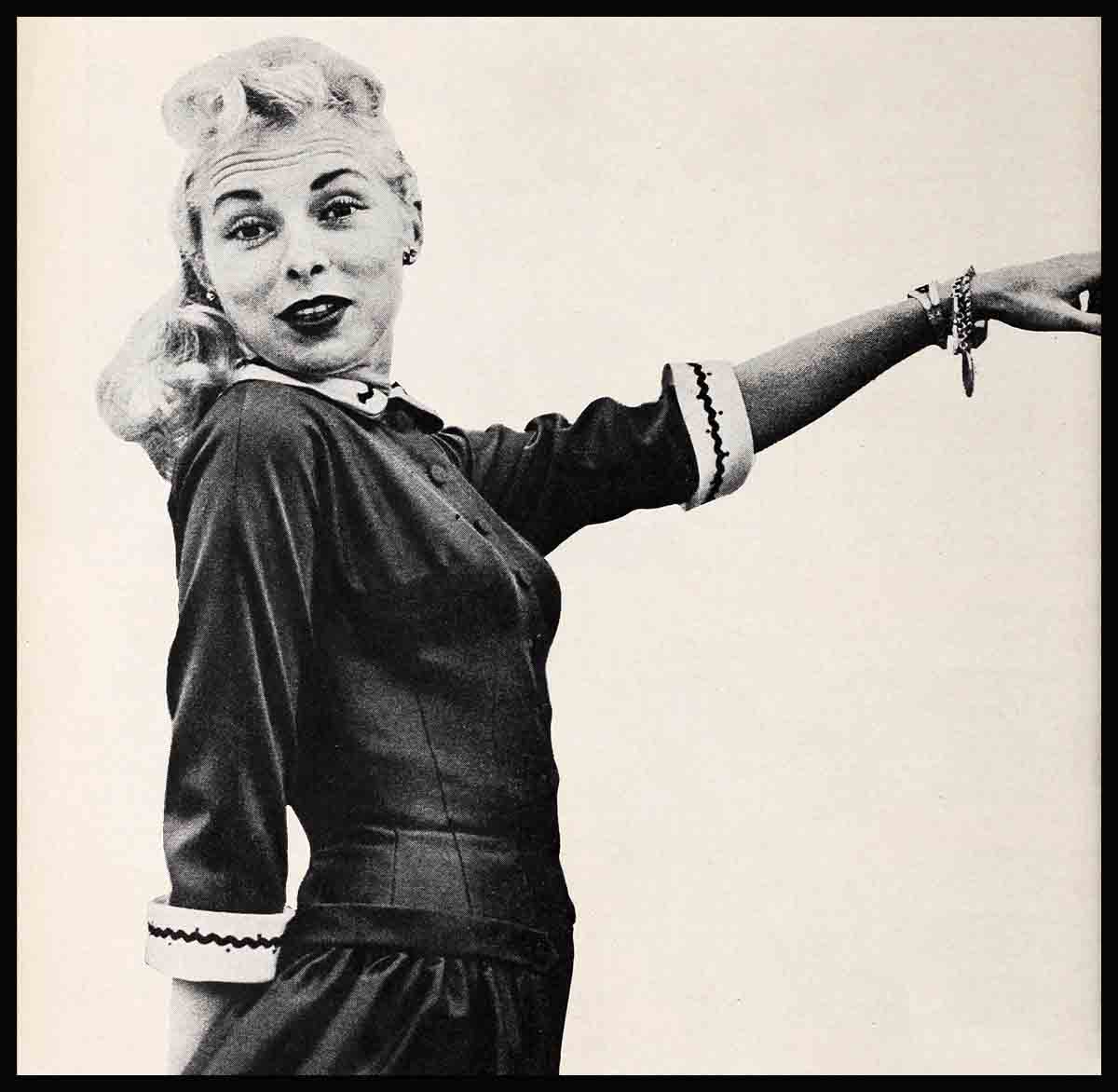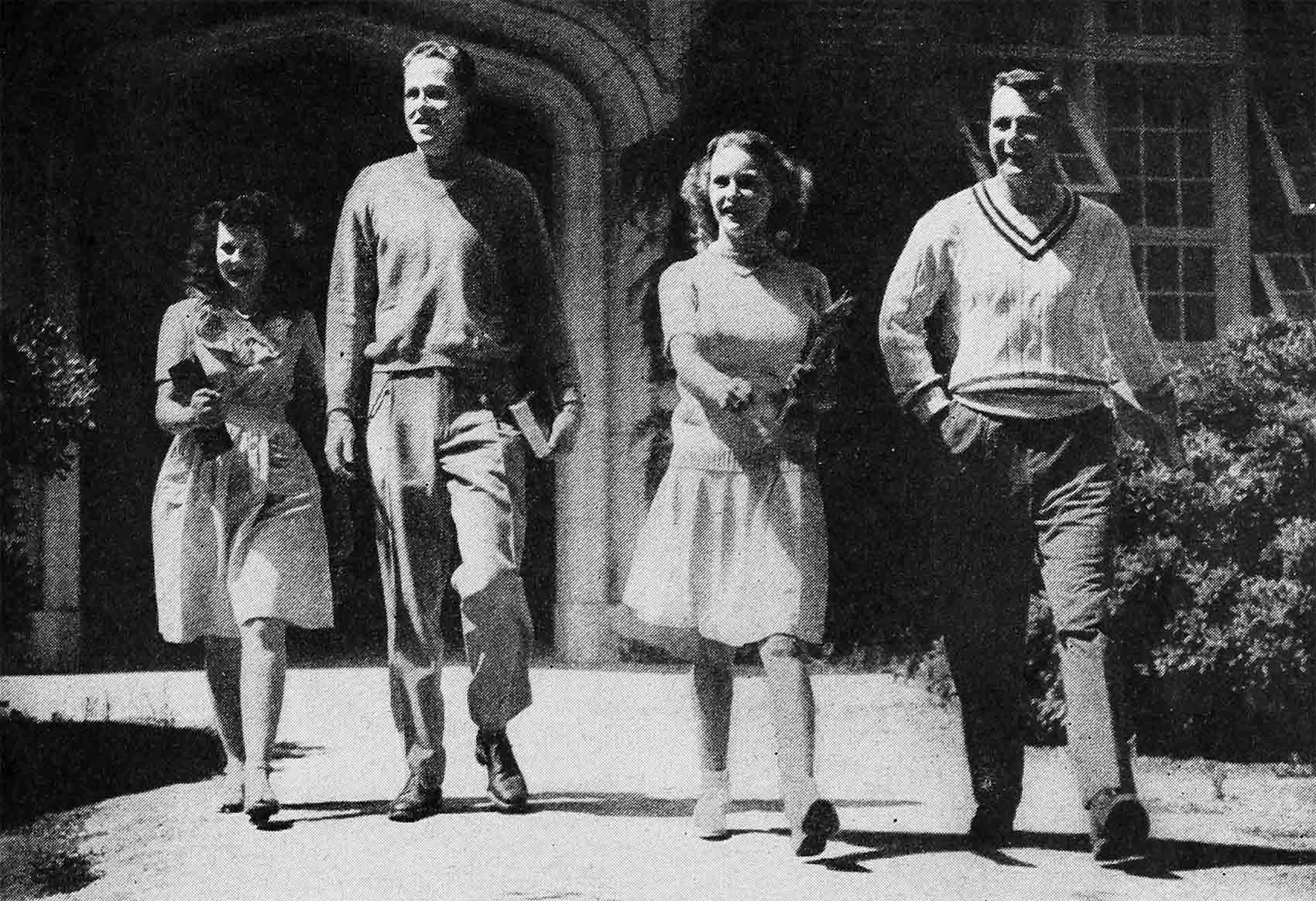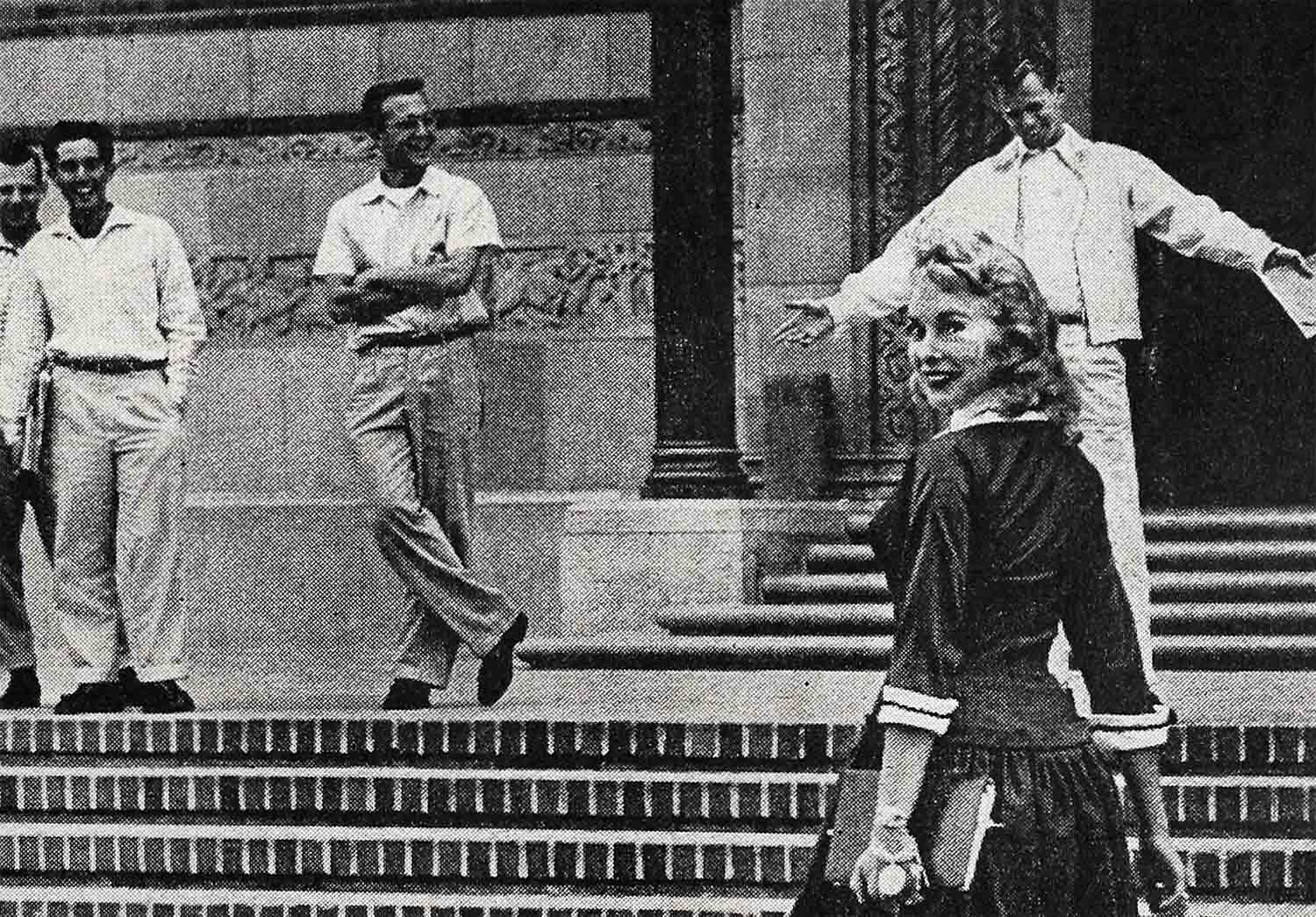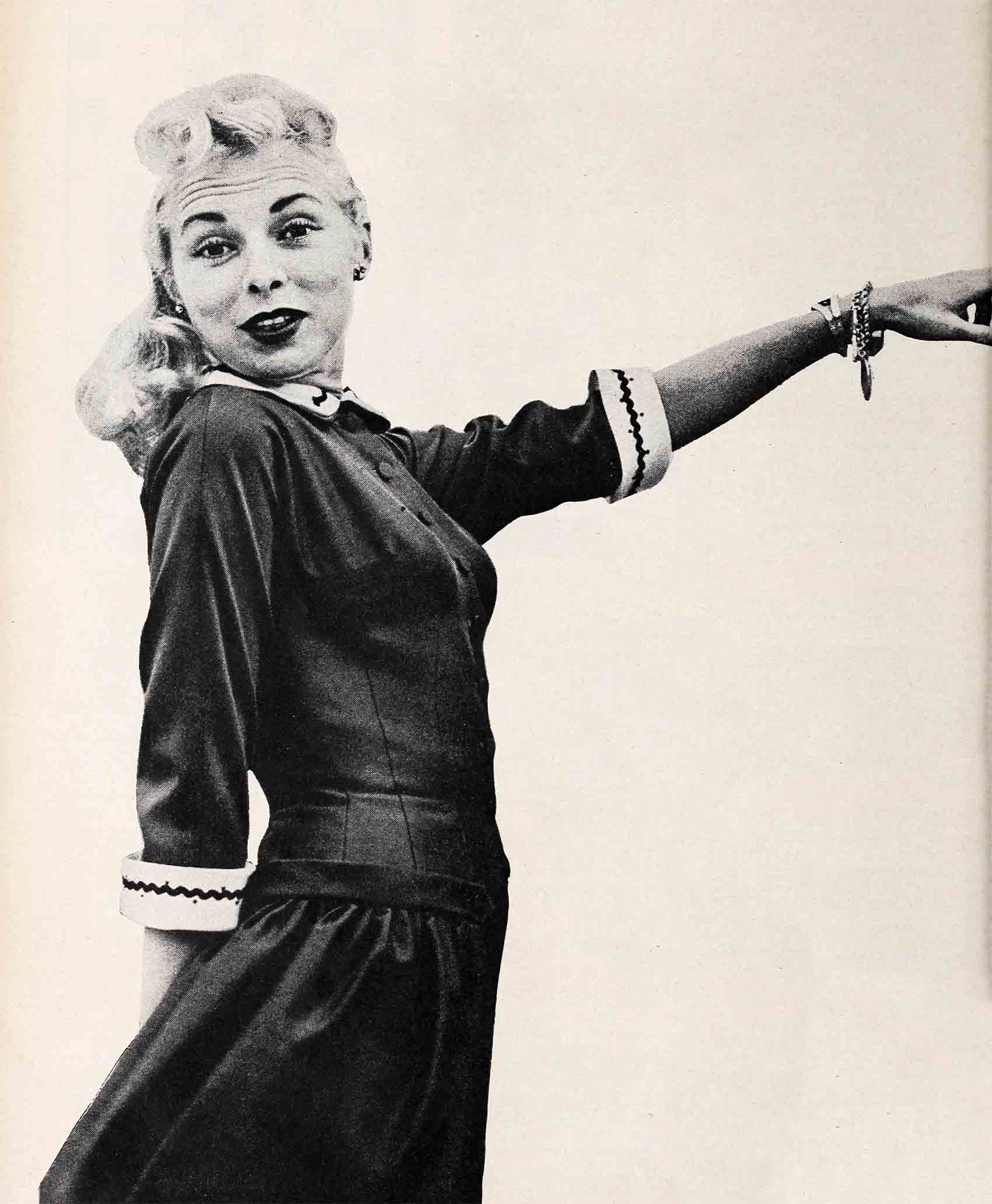
To Be Or Not To Be A Sorority Girl—Janet Leigh
The slim, dark-haired coed rushed across the college grounds. “I have a chance,” she repeated to herself almost like a prayer. “I do. There’s always a chance.”
There was expectancy in the crisp fall air. Today was the day. From all parts of the college campus, girls were congregating in the Dean’s office. Some were confident, some dreading. Daring herself to hope, the girl stood in line with the others and waited for the small envelopes which seemed to hold the key to their college futures. The sorority bids were out. After weeks of rushing, parties, teas, luncheons, dinners, the results would be known.
With the results came tears, happy tears, tears of defeat. There were congratulations in loud whoops, wholehearted attempts at sympathy. Some members of the crowd melted away in small groups, now bound together by a pledge they would soon make. Others slipped away quietly, solitary figures, heads not so high. They went to their rooms to cry. Some proclaimed that it didn’t matter, but their attempts at bravado fell short. To themselves, they admitted, it mattered terribly.
“Why should I let it make a difference?” asked one dark-haired girl. Then she half-whispered the answer. “They didn’t want me.”
Today, that coed is a famous movie queen. You know her; you’ve seen her many times. She’s beautiful and charming and the fact that she could ever have been unwanted would seem impossible to you. However, she has never forgotten that early disappointment. “I thought my life was over,” she says now. “At that age, it’s a terrible blow. I wanted to run as far away as I could go. Yet, I made myself stay in college, and the experience forced me to do a great deal of growing up. I took stock of myself—not only my shortcomings. To salvage my pride, I had to look for the good qualities beneath my uncertain surface. I had to develop them. “If I had been accepted, I might have been content. I’m certain I wouldn’t have tried as hard for my present success. And I might never have made it.”
This actress was not alone in her feeling of rejection. Each year throughout the country, in high schools as well as colleges, thousands of young girls find themselves facing a similar problem. It’s difficult for a girl to be objective about the matter, to stand back and ask herself, “Is it really so important? Of course, I want to enjoy group friendships, but am I the kind of person who must run with the herd to be happy? Will it be this way for the rest of my life?”

The high-school age is an impressionable one. It’s important to belong, to conform. If you’re different, you run the risk of being a “creep” type. When a girl goes away to college, more often than not she leaves her home and friends for the first time to have a look at the outside world and to learn to live in it. She, too, wants to belong. Because of the emphasis placed upon the cliques and clubs, many students come to feel that there are but two groups in their society: the somebodies and nobodies; the wanted, the un-wanted.
Many educational authorities have tried, time after time, to abolish the sorority system. They’ve taken the stand in the sincere belief that the injury to the rejected girl’s self-respect is too lasting, that it can ruin her school life. Still, from other quarters, the cheers for clubs and sororities are strong. And the controversy goes on.
Hollywood is as close to this problem as any other community. It has left its mark upon members of the motion-picture industry, too.
A great many stars have “been there,” so to speak. Take a girl named Elizabeth Jean Peters, for instance. She attended the University of Michigan and Ohio State. She participated in rushing activities, made casual conversation over considerable cups of tea. Then she watched while freshmen were carefully eliminated as the rushing program progressed. They were the shy girls, she noted, the ones who needed the assurance of acceptance. There were girls who lacked a polished appearance, girls who had to find work between classes to help pay the initiation fee but still wanted desperately to belong. She saw their frantic faces, the disappointment that couldn’t be hidden. “Can this be right?” she asked herself. And to Elizabeth Jean, the only honest reply seemed to be, “No.”
She chose to be a non-sorority girl, a member of the campus independent group. Ironically enough, when a college beauty contest was launched, her group staunchly backed her against sorority contestants and she won the crown. She also won a film contract and went to Hollywood where, as Jean Peters, she is currently starring in “A Man Called Peter.”
On the other hand, take the pretty little freshman who attended her first rush tea at the College of the Pacific. Her name was Jeanette Morrison, now known as Janet Leigh, and she wanted very badly to become an Alpha Theta Tau.
A reception committee met Jeanette’s group at the door of the sorority house when they all trouped in for the initial tea. “How are you?” one of the girls asked pleasantly.

“I’m so nervous I don’t know what I’m doing,” blurted Jeanette, before she could stop the words. Then she looked around for a corner where she could sit down and die of her embarrassment.
The rest of the girls were laughing. But suddenly it dawned upon her that they were laughing with her, rather than at her. At least they would be, if only she could manage a grin. She managed.
“I’ve heard that sororities prefer polished types, or girls whose families have a few oil wells,” says Jeanette. “But I certainly wasn’t what you’d call polished, and my parents were far from wealthy. I was just—well, me!”
As rushing progressed, Jeanette came to know the girls in the Alpha Theta Tau house. The liking was mutual. Being one of them wouldn’t necessarily mean that she would be unable to have other friends. She could simply enlarge her circle. During her second college term, Jeanette, pledged the sorority of her choice and she never regretted it. She still keeps in touch with the members who were close friends during school days.
Although Mitzi Gaynor never attended college, she has seen two sides of the sorority story and she has a special interest. Not long ago, she was invited to be a hostess at a Ski Ball, given by students of the University of Nevada. “At the time, I was hesitant about accepting,” she remembers. “I wondered if my lack of degree or sorority pin would matter. But I had no cause for worry. These students were the friendliest I’ve ever met. They knocked themselves out to make my stay a pleasant one.”
Sometime later, Mitzi visited another college group to aid in selecting a sorority girl as queen of the campus festivities. “You always get an icy feeling when you know people are sizing you up in a rather superior manner,” says Mitzi. “And that’s exactly what these girls were doing.”
“Were you in the picture “Take Care of My Little Girl’?” asked one hostess by way of conversation.
“Yes,” said Mitzi. “I was.”
“What a dreadful picture,” shuddered.
“All evening long, it seemed that I was merely being tolerated, simply because I’d never been to college,” says Mitzi. “But if I had been, you can bet that this was the kind of group I’d have steered clear of. But you can’t blast sororities as a whole. And by the same token, you can’t praise them as a whole. It’s an individual matter, depending upon your own attitude and upon the members of the group in question.”

Jean Peters says, “I think there’s tragedy in the fact that so many students arrive at school under the impression that a sorority is essential to their happiness. They’ve heard it from high-school chums, from older friends who are members, or from their sorority-conscious mothers or sisters.
“In so many schools, the rushing system is a hectic thing. No one has much of an opportunity to get to know anyone. It’s all based on first impressions, and the way prospective pledges are raked over the coals, sometimes, it seems pretty heartless.
“Of course there are favorable aspects of sorority life,” says Jean. “I’ve heard them and I respect them. However, I guess my initial brush with these groups made a rather deep impression.”
And Janet Leigh? “I have a definite feeling about sororities,” she says. “I think they’re constructive, if they’re handled in a certain way. Sororities should not be a competitive thing. There should be enough for everyone, so that if a girl wants to join one, she can.
“Sororities weren’t brought about by snobbery, and it’s a shame that it has crept into many of them. Originally, they were formed by people who liked one another, enjoyed the same things.
“This doesn’t mean that the girls lose their individuality. At least, it certainly isn’t necessary. It means there’s someone standing by to encourage you.
“It doesn’t mean that your acquaintances will be screened or limited either. If you do happen to stick closely to your group, it’s likely you’d form your own little clique and stay there anyway.
“Of course, sororities want to pledge girls who can contribute to the group. Personalities are bound to enter into the matter—and grudges. But these are things that one must face during an entire life.
“You don’t have to be an actress to realize the importance of the phrase, “To thine own self be true,” says Janet. “But if you don’t give it some thought, you’re likely to defeat your own purpose.
“This could happen if you’re just starting to work in a large office. But let’s say instead that you’re just beginning college. Suddenly you’re plopped down in the middle of a strange campus. Then you meet a group of girls and you find yourself admiring them. Naturally, you’d like to be one of them.
“But stop for a moment and examine your motives. Do you honestly like them, or are you simply impressed by their sorority pins? Do they really like you for yourself? Have you given them a chance to know the real you?
“During the rushing period, the rushees try so hard to make a good impression. They have stiff competition and that affects people in different ways. Some clam up completely, others chatter incessantly, put on airs that don’t become them. It’s hard to say, ‘Be yourself. Be natural.’ It’s difficult to do. I just happened to stumble upon the secret!
“A girl should stop and ask herself just why she wants to join a sorority or a club. She should analyze the kind of group it may be. A girl who cannot join a snobbish group need have no fears about being a social failure. She should realize that girls who flaunt their sorority pins have little else to flaunt.
“Although I pledged a college sorority, I do know what rejection can mean. I faced it in high school. There was a sorority in my school and I wanted to become a member. I was blackballed.
“It hurt. It always does. However, I figured you can sit around feeling sorry for yourself for just so long. I looked around for other clubs. I joined a singing group. I joined the Campfire girls. I worked hard and made the Honor Society. And I had so many friends and was so busy that my disappointment vanished.
“These clubs were fun, but we were also accomplishing something, learning something. To my mind, this is the way every sorority or club should be.
“I know that a lot is said about the tomfoolery that goes on in high-school and college sororities. I also know that the hazing during what they call “Hell Week” can be injurious. However, I believe that these groups are growing out of it, slowly, perhaps, but surely.
“It began, I believe, with a young veteran who returned to school after his Army days. He suggested that Hell Week be turned into Help Week. In turn, the National Interfraternity Council recommended that Help Week become a new tradition. All over the country, sororities and fraternities have taken it up. Instead of wasting energy in mischievous tricks, they’ve volunteered as aids for hospitals and recreation centers. They’ve asked pledges to help with Scout meetings. They’ve financed scholarships for foreign students who want to do graduate work in this country and also more scholarships for American students doing graduate work abroad. And these scholarships are open to all students.
“A sorority can be what it’s members make it,” concludes Janet. “And your life can be whatever you want to make of it.”
And while the pros and cons still rage, its a thought to remember.
THE END
—BY JUNE CLARK
It is a quote. PHOTOPLAY MAGAZINE OCTOBER 1955




